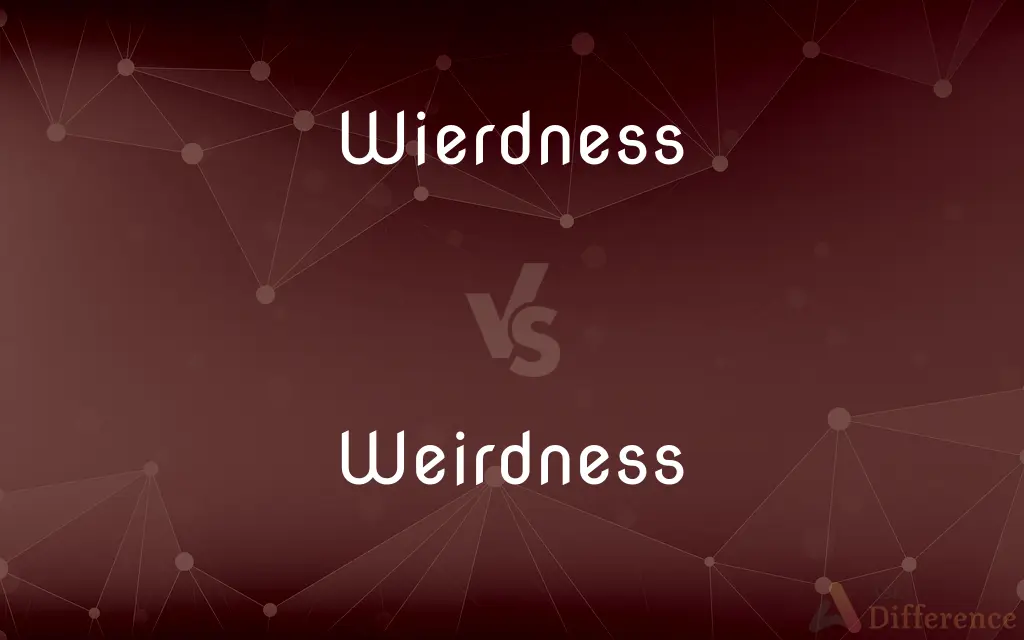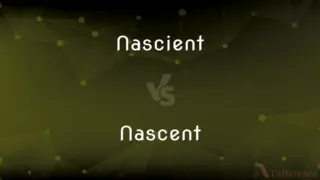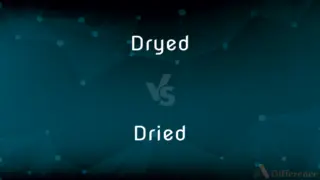Wierdness vs. Weirdness — Which is Correct Spelling?
By Tayyaba Rehman — Updated on April 2, 2024
"Wierdness" is incorrect. The right spelling is "Weirdness", referring to the quality of being strange or unconventional.

Table of Contents
Which is correct: Wierdness or Weirdness
How to spell Weirdness?

Wierdness
Incorrect Spelling

Weirdness
Correct Spelling
ADVERTISEMENT
Key Differences
Use the phrase: “I before E, except after C” but remember weirdness is an exception.
Rhyme it with “feared”, which has the same 'e' before 'i' pattern.
Think of "weird" as its own word, and then just add "-ness".
Envision a "weird nest" when thinking of the word, emphasizing the 'e' before 'i'.
Link "weird" with "beard", both have 'e' before 'i'.
ADVERTISEMENT
How Do You Spell Weirdness Correctly?
Incorrect: I enjoy the wierdness of his movies; they're uniquely bizarre.
Correct: I enjoy the weirdness of his movies; they're uniquely bizarre.
Incorrect: We embraced the wierdness of the entire experience.
Correct: We embraced the weirdness of the entire experience.
Incorrect: The wierdness of the situation made everyone uncomfortable.
Correct: The weirdness of the situation made everyone uncomfortable.
Incorrect: The wierdness in the air was palpable when the lights went out.
Correct: The weirdness in the air was palpable when the lights went out.
Incorrect: Her wierdness is what makes her so interesting and fun to be around.
Correct: Her weirdness is what makes her so interesting and fun to be around.
Weirdness Definitions
Strikingly odd or unusual, especially in an unsettling way; strange
He lives in a weird old house on a dark street. Your neighbor is said to be a little weird. I felt a little weird after drinking that tea.
Suggestive of the supernatural
Weird stories about ghosts.
(Archaic)Of or relating to fate or the Fates.
Fate; destiny.
One's assigned lot or fortune, especially when evil.
Slang To experience or cause to experience an odd, unusual, and sometimes uneasy sensation. Often used with out.
(uncountable) The state or quality of being weird.
(countable) The result or product of being weird.
The quality or state of being weird.
Strikingly out of the ordinary
Weirdness Meaning in a Sentence
She wrote a book celebrating the weirdness of everyday life.
His sense of humor has a certain weirdness that not everyone appreciates.
The weirdness of the dream left me feeling unsettled all day.
The weirdness of the sculpture caught everyone's attention at the gallery.
His stories are filled with weirdness, often blurring the line between reality and fantasy.
I've always been attracted to movies that have a certain level of weirdness.
The town is known for its weirdness, attracting artists and musicians.
The weirdness of their traditions surprised the visitors.
Sometimes, the weirdness of a situation is what makes it memorable.
The festival is a celebration of weirdness and creativity.
She finds the weirdness of the city's nightlife fascinating.
He has a knack for finding the weirdness in seemingly mundane situations.
The show's weirdness is what draws its dedicated fan base.
You have to embrace the weirdness to really enjoy the play.
Their music is a mix of beauty and weirdness, creating a unique sound.
The weirdness of the painting lies in its unexpected details.
A sense of weirdness pervades the old mansion, with its hidden rooms and secret passages.
The book explores the weirdness of being human in a modern world.
Common Curiosities
What is the root word of Weirdness?
The root word is "weird".
Why is it called Weirdness?
It's called "weirdness" to describe the quality or state of being weird or strange.
Which vowel is used before Weirdness?
Typically, the article "a" is used, as in "a weirdness".
What is the verb form of Weirdness?
There's no direct verb form of "weirdness", but "weird" can be used adjectivally, as in "That weirds me out."
What is the pronunciation of Weirdness?
/ˈwɪrdnɪs/
Which preposition is used with Weirdness?
"Of" as in "the weirdness of the situation".
What is the singular form of Weirdness?
"Weirdness" (It's uncountable, so it doesn’t have a distinct singular or plural form).
What is the plural form of Weirdness?
It's typically uncountable. Contexts that might require plural, like "various weirdnesses", are rare.
Is Weirdness an adverb?
No.
Which conjunction is used with Weirdness?
Any conjunction can be used based on context, e.g., "and", "but".
Is the Weirdness term a metaphor?
Not inherently, but can be used metaphorically in context.
Is Weirdness a negative or positive word?
It's neutral but often conveys oddness or strangeness, which might be perceived negatively or positively based on context.
Is the word Weirdness imperative?
No.
Is the word Weirdness a gerund?
No.
How do we divide Weirdness into syllables?
Weird-ness.
What part of speech is Weirdness?
Noun.
Which article is used with Weirdness?
"The" or "a", depending on context.
Is Weirdness a noun or adjective?
"Weirdness" is a noun.
Is Weirdness an abstract noun?
Yes, it represents a quality or state.
Is the word “Weirdness” a Direct object or an Indirect object?
It can function as a direct object, e.g., "I appreciate the weirdness."
How many syllables are in Weirdness?
Two syllables.
Which determiner is used with Weirdness?
"This", "that", "such" can be used, depending on context.
Is Weirdness a countable noun?
Typically uncountable.
What is another term for Weirdness?
Oddity.
What is the second form of Weirdness?
Not applicable.
What is the third form of Weirdness?
Not applicable.
How is Weirdness used in a sentence?
"The weirdness of his actions made everyone uncomfortable."
What is a stressed syllable in Weirdness?
The first syllable, "Weird", is stressed.
What is the first form of Weirdness?
Not applicable, as "weirdness" isn't a verb.
Is Weirdness a vowel or consonant?
"Weirdness" is a word containing both vowels and consonants.
Is Weirdness a collective noun?
No.
What is the opposite of Weirdness?
Normalcy or regularity.
Share Your Discovery

Previous Comparison
Nascient vs. Nascent
Next Comparison
Dryed vs. DriedAuthor Spotlight
Written by
Tayyaba RehmanTayyaba Rehman is a distinguished writer, currently serving as a primary contributor to askdifference.com. As a researcher in semantics and etymology, Tayyaba's passion for the complexity of languages and their distinctions has found a perfect home on the platform. Tayyaba delves into the intricacies of language, distinguishing between commonly confused words and phrases, thereby providing clarity for readers worldwide.














































